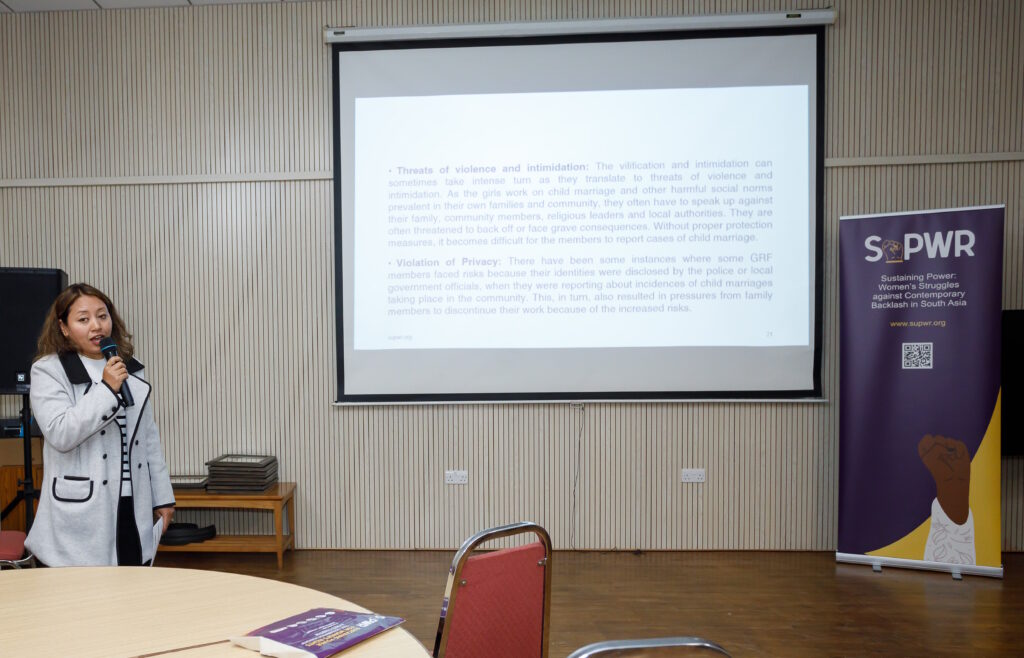In this blog post, Sujeena Shakya and Nirmala Maharjan share their reflections from their interviews with struggle members from the National Alliance of Women Human Rights Defenders in Nepal.
Members of the Nepal National Alliance of Women Human Rights Defenders (NAWHRD) face extreme forms of women’s human rights violations and backlashes from the state and society. Listening to Rama and Laxmi’s (names changed) accounts of these experiences made us realise how getting justice is far more complicated than we think. It is a far cry from reality, particularly for those who have survived or fought against sexual violence. In this blog post we share some reflections from our discussions with Rama and Laxmi.
Experiences of backlash
Both Rama and Laxmi shared experiences of discrimination and backlashes they faced from various state and non-state actors, which makes the process of getting justice very difficult. One of the major reasons for this, as shared by Rama, Laxmi and other research participants is that most of the extreme forms of violence against women gets so politicised. This is demonstrated by the cases of Nirmala Panta, Bhagirathi, and many other women/girls who had been raped and/or brutally murdered but never got justice just because a powerful person was behind such incidents. These powerful people easily divert the main agenda to other secondary things, and other stakeholders, such as media or CSOs, are unknowingly used as a tool by the powerholders. Additionally, everyone is driven by their own self-interest while advocating for the rights of the survivors, which ultimately makes the process of getting justice even more complicated.
Internal contestations
Laxmi also shared about the conflict and power politics at play within their own network of workers in entertainment sector. For instance, the cabin staff considered themselves superior to wait staff, and the wait staff considered themselves superior to bar dancers. This hierarchy and discrimination within the entertainment sector was something that we had never even considered, and it made us realise how the intersectional approach to marginalisation applies in every sector and walk of life.
Impact on personal lives and mental health
As Rama and Laxmi shared the many incidents of sexual and other forms of violence faced by WHRD members and other women and girls, we wondered how working in this sector might have affected their personal and family lives. Rama and Laxmi responded that the whole process is very mentally disturbing and traumatic. “There are times when I even need some psychological counselling, and also times when I am quite angry with myself, my family and society… sometimes I get angry at my husband because he is a male and start thinking he is a rapist too,” shared Rama. This was a very strong statement, but we could feel her sentiments that led her to think and feel that way. It is very hard even to hear such accounts. It was difficult to imagine what she had gone through while working with survivors to help them get justice. Raising the concern regarding the psychological well-being of the WHRDs is so very important.
Uncomfortable truth
Similarly, in the media we hear about so many incidents of sexual violence against women, but tend to ignore or escape them, because it is very disturbing or because it makes us feel uncomfortable or helpless. But listening to these harrowing accounts from someone who had not only witnessed those incidents from so close, but also had been taking steps to fights against these forms of injustice and cruelty by putting their own lives at risk, made it so much different. It reinforced the urgency of the matter and made us realise that we can no longer remain silent or try to ignore such realities.
Getting justice is definitely very difficult and complicated and it could be far cry from reality, however, we should not stop what we can do, from our own levels, to raise our voices against these injustices happening every day in our society.
